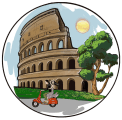Lessons Of History: Looking To Ancient Rome For Hope During Coronavirus Crisis.

Lessons of History: Looking to Ancient Rome for Hope During Coronavirus Crisis.
COVID-19 has swept across the world, forcing us to universally change the way we are living. Aspects of modern life like travel and socialising have become muted. We are a generation used to being able to easily access anything we want, whether that be FaceTiming loved ones living in different continents and time zones, to buying foods we enjoy in the local ‘world food’ aisle at the supermarket. We have become dependent on the benefits of a very globalised and interdependent world. Now what we are left with is fear of what will become of the post COVID-19 future. Understandably, people are dealing with the anxiety of future trade, travel, and employment. But although this is a rather scary time, there is always hope, and we can look at history for reassurance.
In 169 to 180 AD, the Antonine plague overwhelmed the Roman Empire. This plague was what many now believe to be either a smallpox or measles virus. The Roman army brought the virus back to the city of Rome whilst returning from a campaign in the Near East, passing through many towns of the Empire on their return. The Empire was devastated by the virus, it was estimated that a third of the population perished. At its highest, the Antonine plague killed 2,000 people a day, even taking the life of Lucius Verus – the co-emperor at the time. Safe to say, the Roman Empire was hugely affected by this pandemic.
When reflecting on the Antonine Plague, it is hard not to draw comparisons with the current crisis of COVID-19. The devastation of the plague was caused by the growing interdependence of the Empire. As the Empire had a large army and engaged in wide trade, there was an increased movement of people across its landscape. Likewise, COVID-19 has undoubtedly become a global pandemic due to the fact that our world is highly interconnected. This is indicated by the rapidness of the spread of the virus around the world. Travel and trade are two important examples of how easily and quickly viruses like COVID-19 can escalate globally.
Although it is uncertain exactly what will become of the world post-COVID-19, it is clear that the virus will leave its mark in the way we live in the future. However, even though the Roman Empire was greatly affected by the Antonine plague, the empire did recover. The empire continued long after the virus hit, recovering socially, politically, and economically. What followed post-plague was even arguably one of the most artistically prosperous eras of Roman history. The emperor himself Marcus Aurelius who was ruling during the plague (as his co-emperor Lucius Verus died) wrote the Meditations, a collection of self-improving thoughts, which many have found uplifting during the current times. Perhaps the following might lift your spirits:
‘You have power over your mind – not outside events. Realise this, and you will find strength’.
‘Fear does us more harm than the things of which we’re afraid’.
What we should take from this then, is that even though we are living in uncertain times with fears of what will become after the virus, we should remain positive. After all, Rome’s famous motto Roma Invicta, meaning Undefeated Rome, should inspire us – we too shall stay as a world undefeated by COVID-19. Like the Roman Empire after the Antonine plague, the world will recover and we will live connected together in the future.
Author
Grace Johnston
Graduate Classical Studies 2019, King’s College London
grace.c.johnston1997@outlook.com
10.05.20
